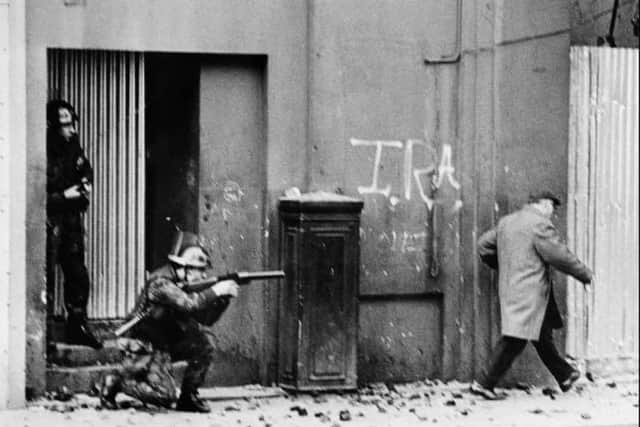Scotland's MSPs 'should refuse consent' for controversial Northern Ireland Troubles bill
Keith Brown said the legislation was “incompatible” with the Scottish Government's view those who suffered during the Troubles should have the opportunity to obtain justice and offenders were held to account.
He said the Bill would also undermine the independence of the Lord Advocate, Scotland's top law officer, and the head of the systems for the investigation and prosecution of crime and investigation of deaths.
Advertisement
Hide AdAdvertisement
Hide AdThe proposed law would provide an effective amnesty for those suspected of killings during the conflict if they agree to co-operate with a new body, known as the Independent Commission for Reconciliation and Information Recovery (Icrir).


The Bill would also prohibit future civil cases and inquests related to Troubles crimes. It has been almost universally opposed by parties across the political divide in Northern Ireland, as well as all victims’ groups.
Giving evidence to Holyrood’s criminal justice committee on Wednesday, Mr Brown said: "The Scottish Government has recommended that Parliament withhold consent for the provisions of the UK Government's Northern Ireland Troubles Bill.
"Our reasons for doing so focus on our concerns regarding the impact of the Bill upon those who were affected by the Troubles, as well as the effect the Bill has on the Lord Advocate's role as independent head of the system of criminal prosecution and investigation of deaths in Scotland.
"Dealing first with those who had the misfortune to be directly affected by the Troubles, we believe that the Bill is incompatible with the Scottish Government's view that those who suffered during the Troubles have the opportunity to obtain justice and that those who committed offences during that time are appropriately held to account and/or punished.
"The Bill will effectively mean an amnesty for those who have committed serious offences such as murder and crimes involving abuse and torture, and we're not the only ones who hold this view."
He pointed to critical comments by the Council of Europe’s Commissioner for Human Rights and the Northern Ireland Human Rights Commission.
Mr Brown said the Lord Advocate's independence predates devolution, but some of the powers proposed for the independent commission "undermine that independence” and breach “a fundamental cornerstone of our criminal justice system".
Advertisement
Hide AdAdvertisement
Hide AdHe said the commission would have powers to grant immunity from prosecution under certain circumstances, which would prevent the Lord Advocate from investigating criminality. It could also refuse to refer cases to the Lord Advocate.
Mr Brown said: "It's not just an academic thing – these cases could come to Scotland and be tried in Scotland." He said the objections were not political, but "well-founded".
The justice secretary stressed the Scottish Government was not against the idea of reconciliation or amnesties, but objected to the way the Bill was constructed. He said it was possible to "see a way through" if the objections were dealt with.
The Scotland Act recognises Westminster “will not normally legislate with regard to devolved matters without the consent of the Scottish Parliament”. However, this is a convention and not a requirement.
Comments
Want to join the conversation? Please or to comment on this article.
